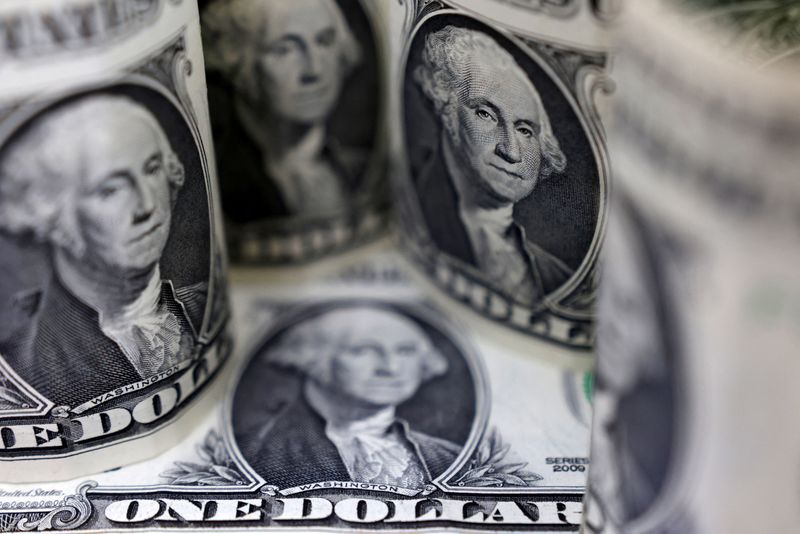By Sarupya Ganguly
BENGALURU (Reuters) - The U.S. dollar will claw back some of its recent losses over the coming three months on expectations financial markets have again gone too far in pricing in too many Federal Reserve interest rate cuts this year, a Reuters poll of foreign exchange strategists found.
After rising about 5% for the year, the greenback lost more than half its gains against a basket of major currencies in recent weeks amid sluggish U.S. economic data fuelling expectations of multiple Fed rate cuts, starting in September.
Much of those losses came following weaker-than-expected jobs data on Friday, which encouraged financial markets to project around 120 basis points worth of rate cuts in total from the three remaining Fed meetings this year, compared with 50 basis points just a few weeks ago.
Several major banks, including primary dealers who deal directly with the Fed, followed suit in predicting more rate reductions than expected earlier.
Yet with policymakers pushing back against speculation that recent weakness in economic data would translate into recession, markets may yet again be forced to temper their rate cut expectations.
FX strategists in the monthly Reuters poll, conducted from Aug. 1-6 through recent market turmoil, predicted the euro, currently about $1.10, would fall about 1.4% to $1.08 by end-October, before rising to current levels in six months and then to $1.11 in a year.
"Our strong dollar argument has certainly taken a big hit in terms of confidence, but is its strength truly over? That's not our call," said Paul Mackel, global head of FX at HSBC. "Our recession indicators are not flashing red. And even if the U.S. economy loses momentum, that usually spells bad news for other economies. The dollar does better in that environment."
"Are markets getting carried away? Naturally, I'd say yes, but it's difficult to stand in front of that speeding train in the very short term because this type of overreaction can persist," Mackel added. "You need to be very careful when volatility is this high and you're not used to it coming back so quickly."
MAJOR CUTBACK
The Japanese yen, which started its latest upward march against the U.S. dollar after the Bank of Japan raised its overnight call rate to 0.25% on July 31 and announced a major cutback in its asset purchases going forward, hit a seven-month high of 141.7/$ on Aug. 5. It will hold on to its recent gains to trade at 144/$ in a year, the survey showed.
Some FX analysts, however, attributed much of those gains to traders unwinding large volumes of carry trades - where investors borrow from economies with low rates to fund investments in higher-yielding assets elsewhere - which sent the Nikkei stock market index down more than 12% on Monday and then back up over 10% on Tuesday.
The latest positioning data from the Commodity Futures Trading Commission (CFTC) before recent market volatility also showed speculators had slightly increased their net long bets on the U.S. dollar.
Forecasters in previous Reuters polls, who for years have held on to their expectations of a weakening dollar, were split when asked if it was more likely the dollar would trade stronger or weaker than they predicted for the remainder of the year. A slight majority, 32 of 62, said stronger, while 30 said weaker.

"Setting recent developments aside for a minute, we're generally in the soft-landing camp and think once the U.S. economy starts to recouple with the rest of the world's economies, we'll see the dollar's outperformance and more importantly, its overvaluation, start to normalize a bit going forward," said Alex Cohen, FX strategist at Bank of America.
(For other stories from the August Reuters foreign exchange poll click here)